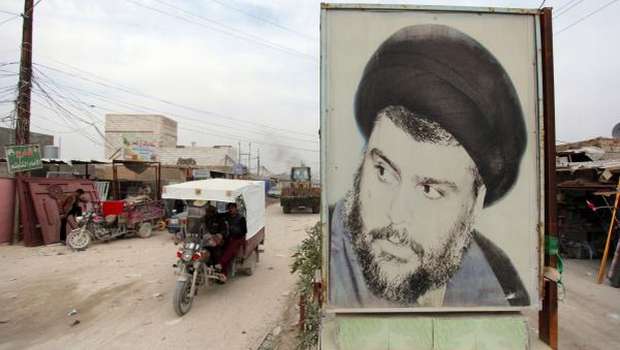
A picture taken on February 16, 2014 shows a three-wheeler driving past a portrait of Iraqi Shiite cleric Moqtada al-Sadr in the shrine city of Najaf in central Iraq ( AFP PHOTO/HAIDAR HAMDANI)
Sadr has made such announcements before, but the current declaration comes only two months before national parliamentary elections. Sadrists hold 40 out of 325 seats in the legislature, making them the largest single Shi’ite bloc, and hold six Cabinet seats.
In the late Saturday statement, Sadr said his move was to “preserve the reputation of the al-Sadr [family]…and to put an end to all the wrongdoings that were conducted, or could be conducted, under their title.” It did not explain further.
“I announce here that I will not interfere in politics. There is no political entity that represents me anymore nor any position in parliament and government,” it said. “Whoever acts against this will be subjected to legal and religious action.” He also ordered all Sadr political offices to be closed down.
Sadr came to prominence in the 2003 US-led invasion that toppled Saddam Hussein, whose regime killed his father and grandfather. He established his Mahdi Army militia that fought the Americans and is blamed by many Iraqis for much of the sectarian violence that raged in Iraq in 2006 and 2007.
Meanwhile, Iraq’s main Al-Qaeda breakaway group claimed on Sunday responsibility for an audacious attack on a military barracks that killed 15 troops last week.
The troops were assigned to protect an oil pipeline that sends Iraqi crude oil to international markets, as well as to guard a nearby highway outside the northern city of Mosul. Eight of the soldiers were beheaded in the Monday attack while the rest were killed by gunfire.
Along with the statement, posted on a website commonly used by jihadists, the Islamic State of Iraq and Syria put up an image of the beheading of one of the soldiers, as well as captured arms and vehicles. They statement also listed other attacks against security forces in and around Mosul, about 225 miles (360 kilometers) northwest of Baghdad.
The authenticity of the statement couldn’t be independently verified, but its style was consistent with previous statements.
